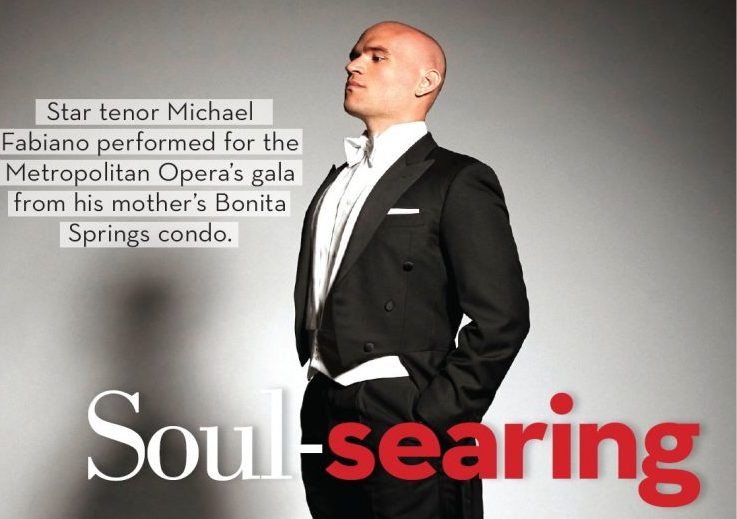Bonita Springs joins the world’s capitals for Fabiano’s Met gala solo
Like many other arts organizations, the Metropolitan Opera is hoping to stem income losses during its coronavirus crisis closure with an “At Home” online gala.
Unlike many other arts organizations, the Met — one of the top three opera companies in the world — will be streaming performances by power stars from their homes internationally. Vienna. Paris. South Africa.
Bonita Springs.
Tenor Michael Fabiano, a star so attached to the Met he was married in its opera house, is staying in his mother’s Bonita Springs home while isolation requirements keep arts venues closed. So on Saturday, April 25, he’ll join from there, one of 41 opera stars around the world singing arias to their computers.
The company will not release the order of appearance and the music each star is singing. It is sending Fabiano recorded piano accompaniment to allow him to rehearse and perform live without anyone entering the home. In fact, even Fabiano’s affectionate pooch, Buster, is barred.
“I’m going to stick him out on the lanai with me and lock the door because he likes to sing opera with Michael. And it’s wild,” his mother, Carole Fabiano, added.
If Buster has the same acumen as his human companion, he knows the starring tenor roles in “La Traviata,” “La Boheme,” Massanet’s “Manon” and “Carmen.” And will have sung them all over the world: The Royal Opera, the Glyndebourne Festival, La Scala, Paris Opera and more. Fabiano is particularly welcome at the Met, where he once stepped in on seven hours notice to sing the wronged lover, Edgardo, in “Lucia di Lammermoor.”
Fabiano had been starring as Don Jose in “Carmen” at the Staatsoper Berlin when COVID-19 began to shut down the world. The second performance was the company’s last before the opera house was closed. But the production offered one performance, done without an audience, and live-streamed it to the world March 11.
Then Fabiano came back to the U.S. and flew to Bonita to spend his shelter weeks with his mother.
“One, I didn’t want to stay in my house in New Jersey where it’s much more of a hotbed (for coronavirus) than it is here,” he said, and then chuckled. “Two, it’s warm!”
“It’s nice to be near my parents, whom I’m rarely near, so that’s a good thing,” Fabiano added.
There’s a piano in the home, and Fabiano says he can blend singing with intellectual study: historical backgrounds, character interpretations, composers: “I don’t have to be singing to study.”
Fabiano doesn’t mind taking something of a break from singing, either. “I’ve been working straight for the last 36 months, so it’s nice to have two weeks, three weeks of not overdoing it.”
It has been a month, however. And Fabiano is ready to work again. He’s already studying “Un Ballo in Maschera,” “Tosca” and “Don Carlo,” “even though I think it’s going to be cancelled in the next few weeks,” he lamented of the last opera. “We’re getting all these crazy notices that we’re not going to have operatic engagements for over a year. I’m not going to believe it. I think it’s overkill.
“I understand social distancing at this point. I understand the need to wear a mask. But I don’t think you can stop the economic engine for a year, especially in venues that have more than 20 people,” he said.
He concedes re-opening theatrical doors will be a slow process. It may require temperature checks of anyone who enters and theater, and it may be done without permitting a full house. But without some “bold general directors,” he said, his art’s future is blank.
“I have no idea what’s next, and nor do any of the hundreds of thousands of us in the opera business,” he said. “No one really has any idea.”
On Saturday, however, Fabiano will sing again. He didn’t even know if the event was to raise money, he said: “I’m singing to make people who love music happy.”
